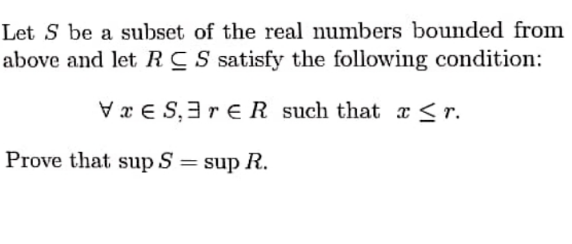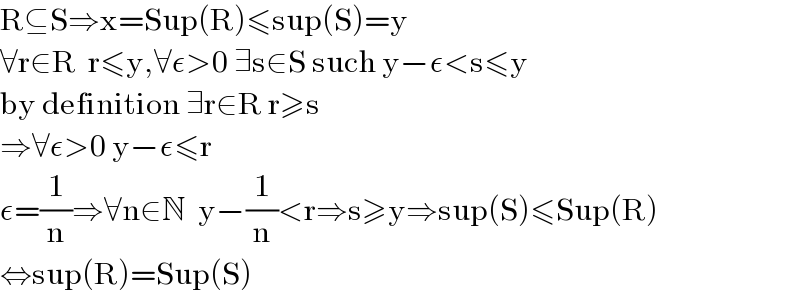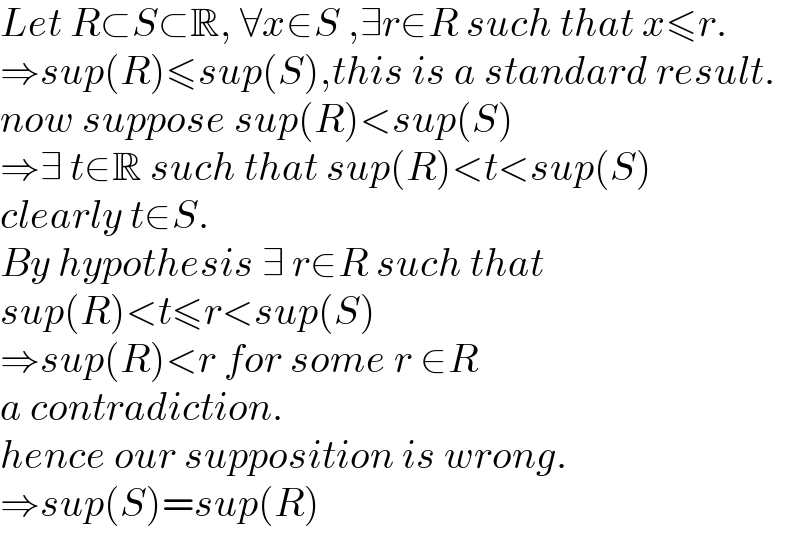
Question Number 192299 by Mastermind last updated on 14/May/23

Answered by witcher3 last updated on 14/May/23

$$\mathrm{R}\subseteq\mathrm{S}\Rightarrow\mathrm{x}=\mathrm{Sup}\left(\mathrm{R}\right)\leqslant\mathrm{sup}\left(\mathrm{S}\right)=\mathrm{y} \\ $$$$\forall\mathrm{r}\in\mathrm{R}\:\:\mathrm{r}\leqslant\mathrm{y},\forall\epsilon>\mathrm{0}\:\exists\mathrm{s}\in\mathrm{S}\:\mathrm{such}\:\mathrm{y}−\epsilon<\mathrm{s}\leqslant\mathrm{y} \\ $$$$\mathrm{by}\:\mathrm{definition}\:\exists\mathrm{r}\in\mathrm{R}\:\mathrm{r}\geqslant\mathrm{s} \\ $$$$\Rightarrow\forall\epsilon>\mathrm{0}\:\mathrm{y}−\epsilon\leqslant\mathrm{r} \\ $$$$\epsilon=\frac{\mathrm{1}}{\mathrm{n}}\Rightarrow\forall\mathrm{n}\in\mathbb{N}\:\:\mathrm{y}−\frac{\mathrm{1}}{\mathrm{n}}<\mathrm{r}\Rightarrow\mathrm{s}\geqslant\mathrm{y}\Rightarrow\mathrm{sup}\left(\mathrm{S}\right)\leqslant\mathrm{Sup}\left(\mathrm{R}\right) \\ $$$$\Leftrightarrow\mathrm{sup}\left(\mathrm{R}\right)=\mathrm{Sup}\left(\mathrm{S}\right) \\ $$
Commented by York12 last updated on 14/May/23

$${sir}\:{I}\:{am}\:{a}\:{high}\:{school}\:{student}\:{and}\:{I}\:{have}\:{several}\:{questions}\:{how}\:{can}\:{I}\:{reach}\:{you}\:{out} \\ $$$${that}'{s}\:{my}\:{telegram}\::\:{yorkgubler} \\ $$
Commented by Mastermind last updated on 14/May/23

$$\mathrm{Thank}\:\mathrm{you}\:\mathrm{so}\:\mathrm{much} \\ $$
Answered by Rajpurohith last updated on 27/May/23

$${Let}\:{R}\subset{S}\subset\mathbb{R},\:\forall{x}\in{S}\:,\exists{r}\in{R}\:{such}\:{that}\:{x}\leqslant{r}. \\ $$$$\Rightarrow{sup}\left({R}\right)\leqslant{sup}\left({S}\right),{this}\:{is}\:{a}\:{standard}\:{result}. \\ $$$${now}\:{suppose}\:{sup}\left({R}\right)<{sup}\left({S}\right) \\ $$$$\Rightarrow\exists\:{t}\in\mathbb{R}\:{such}\:{that}\:{sup}\left({R}\right)<{t}<{sup}\left({S}\right) \\ $$$${clearly}\:{t}\in{S}. \\ $$$${By}\:{hypothesis}\:\exists\:{r}\in{R}\:{such}\:{that}\: \\ $$$${sup}\left({R}\right)<{t}\leqslant{r}<{sup}\left({S}\right) \\ $$$$\Rightarrow{sup}\left({R}\right)<{r}\:{for}\:{some}\:{r}\:\in{R} \\ $$$${a}\:{contradiction}. \\ $$$${hence}\:{our}\:{supposition}\:{is}\:{wrong}. \\ $$$$\Rightarrow{sup}\left({S}\right)={sup}\left({R}\right) \\ $$
